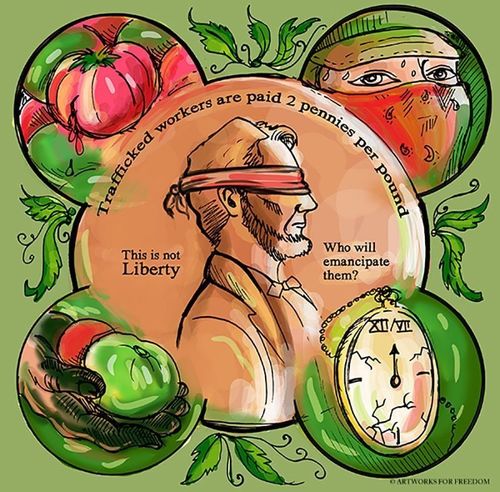Advocate

-
Be a conscientious and informed consumer.
Find out more about who may have picked your tomatoes or made your clothes at ResponsibleSourcingTool.org, or check out the Department of Labor’s List of Goods Produced by Child Labor or Forced Labor. Encourage companies to take steps to prevent human trafficking in their supply chains and publish the information, including supplier or factory lists, for consumer awareness.
-
Join the ArtWorks for Freedom 30 Actions | 30 Days challenge to confront Human Trafficking.
-
Slavery Footprint
Slavery is a business. Be a better consumer. Take this survey to learn how many slaves are working for you…and what you can do to change it.
-
Serve organizations fighting human trafficking.
Non-Profit and Government Organizations:
U.S. Catholic Sisters Against Human Trafficking: a collaborative, faith-based national network that offers education, supports access to survivor services and engages in advocacy to eradicate modern-day slavery. Resources include trafficking reports and a means to add your voice to advocacy efforts.
International Justice Mission (IJM): IJM's mission is to protect the poor from violence by rescuing victims, bringing the criminals to justice, restoring survivors to safety and strength, and helping local law enforcement build a safe future that lasts.
ArtWorks for Freedom: conducts multifaceted, arts-based awareness campaigns in cities and communities across the globe that combine exhibitions, performances, lectures and other events to draw attention to human trafficking.
Campus Organizations:
Notre Dame Student Chapter of International Justice Mission (IJM)
Contact co-president Ella Wood (ewood1@nd.edu) or Malia Marshall (mmarsh11@nd.edu)
St. Mary’s Belles Against Violence Office (BAVO)
-
Use an Anti-trafficking App
25 million people in our world are trapped in forced labor. Where? What products? How? The apps below provide labor trafficking education and guide more informed decision-making.
Sweat & Toil: Child Labor, Forced Labor, and Human Trafficking Around the World
Sweat & Toil is a comprehensive resource developed by the U.S. Department of Labor (USDOL) documenting child labor and forced labor worldwide. Data and research in this app are taken from USDOL’s three flagship reports: Findings on the Worst Forms of Child Labor; List of Goods Produced by Child Labor or Forced Labor; and List of Products Produced by Forced or Indentured Child Labor. This app fits these three information-packed reports the size of a phone book in the palm of your hand. Five things you can do with this app are:
- Check countries' efforts to eliminate child labor
- Find child labor data;
- Browse goods produced with child labor or forced labor
- Review laws and ratifications; and
- See what governments can to do end child labor.
Comply Chain: Business Tools for Labor Compliance in Global Supply Chains
The Comply Chain app targets companies and industry groups seeking to develop robust social compliance systems for their global production. It provides a practical, step-by-step guide to critical elements of social compliance and is designed for companies that do not have a social compliance system in place or for those needing to strengthen their existing systems. An integrated social compliance system includes: engaging stakeholders and partners, assessing risks and impacts, developing a code of conduct, communicating and training across the supply chain, monitoring compliance, remediating violations, independent review, and reporting performance and engagement. The app contains many examples of specific good practices that companies, industry groups, and multi-stakeholder initiatives have put in place in these eight areas.